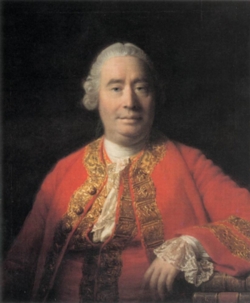Liberty Matters
Liberty: a Destination, Not Starting a Point

In this excellent discussion of the place of liberty in David Hume's philosophy and political thinking, there is more to agree with than to disagree with, but a number of puzzles have been raised. I will try my hand at one of them: the question of the presumption of liberty for Hume. While I find this assumption of the presumption of liberty in Hume most appealing, I am afraid I must side with Chandran and Andy over whether or not it is Hume's view. So if there is no presumption of liberty in Hume, where is liberty, given that it is very, very important to him? (I think we can all at least agree on that minimal claim). For me, the place to go to is Hume's essay "Of the Origin of Government," where he says "that liberty is the perfection of civil society."[48] Taken most simply, this implies that liberty is something that is accomplished, not something that is taken as given or presumed. Liberty is not a starting point; it is a destination.
So what are the prerequisites of liberty in a civil society? Hume does not have a state of nature the way Hobbes and Locke do, but he does have a conception of rudimentary society without government. However, he is not all that interested in this, except as an anthropological "fact" and certainly not as a source of legitimacy for government. Hume's account argues that even this rudimentary society requires justice, which for him means what most people mean by rule of law: property rights, contract, freedom of exchange. So it probably makes more sense to talk about a presumption of justice for Hume, which is a necessary but not sufficient condition for liberty.
But that is not all. Hume says liberty is the perfection of civil society, meaning society under government and the rule of law. This suggests that liberty cannot be perfected in the rude state of society prior to government. So justice and government, primarily as the necessary instrument for enforcing the rules of justice, are the perquisites for liberty. But what makes for a free government and a civil society, and what is the role of liberty as a test for government legitimacy? We know from reading Hume elsewhere[49] that he does not accept the Lockean view that consent is the sole the source of government legitimacy. All government is grounded on opinion, and people obey a government through a mixture of force and consent based on their opinion of the might and right of the given government, along with their opinion of their own interests. In this sense, all governments that exist are "legitimate," including despotic regimes and certainly monarchical ones. Hume has no patience for the view that only regimes based on a social contract or that have a republican political structure are legitimate. However, he does offer a criterion for a free government, one that has a "partition of power among several members" who are bound by "general and equal laws, that are previously known to all the members and to all their subjects."[50] This is the regime, with its division of powers, which will best enable individual liberty. However, it also seems to recognize that liberty needs to be jealously guarded once established or it can be lost.
In conclusion, a couple of words on the relevance of this argument for Hume's History of England: Hume regards 18th-century Britain as a particular and contingent institutional accomplishment of the ideal and practice of liberty in civil society. The account given in his multi-volume History offers a complicated, chaotic, and violent history of how these institutions emerged, frequently through the unintended consequences of the actions of the different historical figures. It is not a simple story of the recovery of ancient liberty that was somehow inevitable. While Hume's History is a story of the emergence of liberty, its outcome is not a necessary one, and there is nothing to say that it cannot be reversed.
Endnotes
[48.] Essay V "Of the Origin of Government" (Liberty Fund edition), p. 41.
[50.] "Of the Origin of Government," Liberty Fund edition, p. 41.
Copyright and Fair Use Statement
“Liberty Matters” is the copyright of Liberty Fund, Inc. This material is put on line to further the educational goals of Liberty Fund, Inc. These essays and responses may be quoted and otherwise used under “fair use” provisions for educational and academic purposes. To reprint these essays in course booklets requires the prior permission of Liberty Fund, Inc. Please contact oll@libertyfund.org if you have any questions.